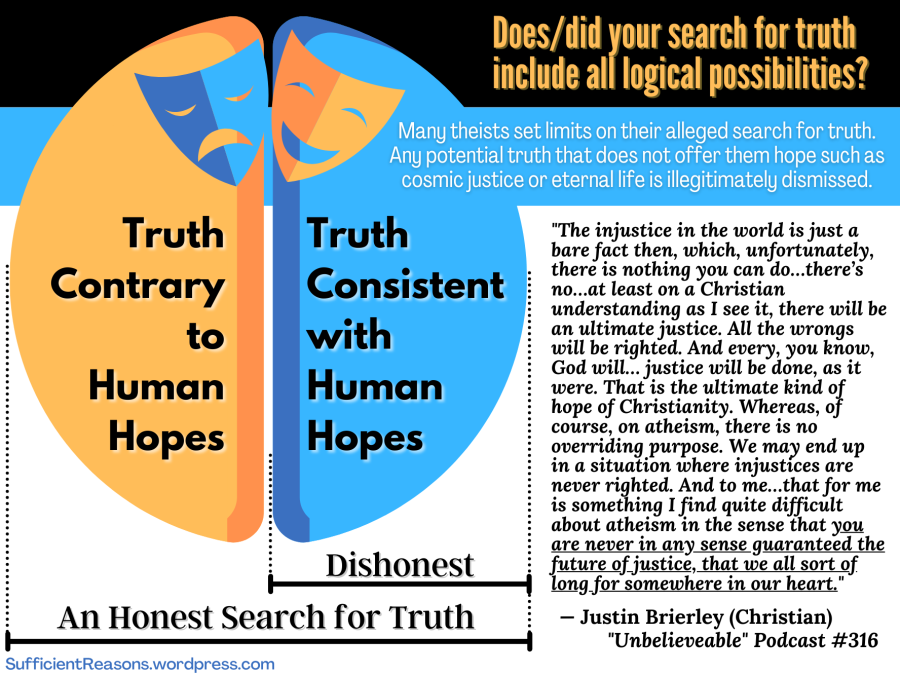 Q: Why are the historicity of Jesus and the historical reliability of the Bible not addressed in this book?
A: The historicity of Jesus and the general historical reliability of the Bible are assumed for the sake of argument. There could have been a man named Jesus, and the non-miraculous historical events mentioned within the Bible could be corroborated by other sources. However, these facts would not invalidate the other more focused arguments on the intrinsic incoherencies and unlikelihood of a Christian God made in this book.
Q: Why are the historicity of Jesus and the historical reliability of the Bible not addressed in this book?
A: The historicity of Jesus and the general historical reliability of the Bible are assumed for the sake of argument. There could have been a man named Jesus, and the non-miraculous historical events mentioned within the Bible could be corroborated by other sources. However, these facts would not invalidate the other more focused arguments on the intrinsic incoherencies and unlikelihood of a Christian God made in this book. - Q: Why are ontological and cosmological arguments for God not addressed? A: If ontological and cosmological arguments were to hold, they would support only a generic impersonal God. This book is focused on demonstrating the implausibility of the Christian God. If these arguments hold, ontological and cosmological arguments will do little to redeem the Christian God from his implausibility. There may be something killing your chickens, but Dracula is not a very plausible candidate.
- Q: Why isn’t evolution mentioned in this book? A: A falsification of evolution would not falsify the arguments in this book. There is a widespread misconception that, if only we can render another ideology less improbable, that makes our own ideology more probable. That is not true when one or more of the ideologies can arise from one’s imagination. If Hindus demonstrate Celtic gods to be improbable, that does not make their own gods more probable.
- Q: Many of the arguments in this book only argue for the improbability of the Christian God. But if you can’t disprove the Christian God, why I am wrong to believe in the Christian God? A: Rational belief is a degree of belief that maps to the degree of the relevant evidence. You can irrationally believe in an improbable God, but that is not what intellectual honesty requires. Our degree of epistemic certainty ought to map to the degree of evidential certainty if we truly wish to be rational.
- Q: There are many arguments against the Christian God that are not included in this book. Why? A: Some common arguments against the Christian God are actually fallacious. Others are weak or insignificant. And others are of a degree of complexity too deep to engage the readers of this book. The arguments in this book were chosen for their direct challenge to the core elements of Christianity, their salience, their evidential weight, and their relative simplicity.
- Q: I’ve read through this entire book, and I still have a strong belief in the Christian God. Did I miss something? A: Not necessarily. If you have honestly evaluated the evidence and arguments presented, and have adjusted your degree of belief accordingly, you have conducted yourself as a noble seeker, regardless of your resulting degree of belief in the Christian God.
- Q: Was this book written by atheists? A: This book was written by those who have a fairly strong belief the Christian God does not exist, yet who generally feel the word “atheist” is inadequate to capture the many possible nuanced degrees of belief across the many definitions of “god” or “God”. We feel that the impulse to self-describe with a low-resolution descriptor such as “atheist” or “agnostic” often distracts from the actual arguments.
- Q: Many references are made to “the actual God of the universe”. Is this suggesting there is such a God? A: No, but if there is a creator of the universe, any candidate God for that position must have attributes we would expect from an actual creator of the universe rather than a God with suspiciously anthropomorphic attributes and an unjustified fascination with one corner of the universe.
- Q: Why are there few actual citations from Christian thinkers? A: A choice was made to avoid citing the positions of Christian leaders in order to keep the discussion focused on the arguments rather than on personalities.
- Q: Why are many of the arguments made in this book not an accurate reflection of my Christian beliefs? A: Since there are many versions of Christianity, it is quite probable that some of the arguments in this book do not reflect the beliefs of some readers, and such readers are welcome to simply ignore the chapters in question.
- Q: How can you give fair treatment to theological notions such as the resurrection in such short chapters? A: It’s a challenge. However, the brevity of each chapter has forced an economical use of words and arguments. It is hoped that the most salient arguments have been presented in each chapter or perhaps in the supplementary materials. If the arguments are indeed too brief, they may be expanded on the companion website in the future.
- Q: Am I honestly searching for truth if I limit my search to only happy truths?
A: Sorry, but no.


-
Subscribe
Subscribed
Already have a WordPress.com account? Log in now.
